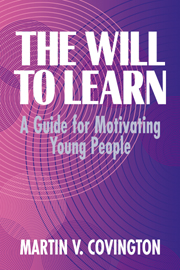Book contents
- Frontmatter
- Contents
- 1 The Future and Its Discontents
- 2 Motives as Emotions
- 3 Motives as Thoughts
- 4 Self-Worth and the Fear of Failure
- 5 The Competitive Learning Game
- 6 Motivational Equity and the Will to Learn
- 7 Strategic Thinking and the Will to Learn
- 8 An Immodest Proposal
- 9 Obstacles to Change: The Myths of Competition
- Epilogue
- Appendixes
- References
- Author Index
- Subject Index
7 - Strategic Thinking and the Will to Learn
Published online by Cambridge University Press: 31 January 2011
- Frontmatter
- Contents
- 1 The Future and Its Discontents
- 2 Motives as Emotions
- 3 Motives as Thoughts
- 4 Self-Worth and the Fear of Failure
- 5 The Competitive Learning Game
- 6 Motivational Equity and the Will to Learn
- 7 Strategic Thinking and the Will to Learn
- 8 An Immodest Proposal
- 9 Obstacles to Change: The Myths of Competition
- Epilogue
- Appendixes
- References
- Author Index
- Subject Index
Summary
Long-range planning does not deal with future decisions, but with the future of present decisions.
Peter DruckerDrucker's remark captures the essence of the relationship between discovered problems and the future. The future depends on, indeed, eventually becomes a history of the kinds of problems we choose either to ignore, to postpone, or to solve, and of the wisdom of our solutions.
It is not that we are without some guidelines for making the best present decisions. Common sense is one source and so are the lessons of history. Another oracle, although largely neglected, is the accumulation of folk wisdom known as Murphy's laws or the Official Rules (Dickson, 1978). This neglect is all the more puzzling given the uncanny accuracy of these laws. Who can easily dismiss the observation that “for every human problem there is a neat, plain solution – and it is always wrong.” Or ignore the warning, “if you think the problem is bad now, just wait until you've solved it.”
Murphy's laws have become a user's manual for dealing with an unpredictable world of perversity, surprises, and contrary events. Naturally, they cannot tell us precisely what will happen or exactly when. Still, Murphy and his intrepid band of lawgivers have put us on notice in advance for why sometimes things may turn out badly, or at least differently than expected.
By taking Murphy's laws seriously, we are compelled to wonder, if the simplest solution is so often wrong, then why are we not more suspicious of simplicity to begin with?
- Type
- Chapter
- Information
- The Will to LearnA Guide for Motivating Young People, pp. 167 - 199Publisher: Cambridge University PressPrint publication year: 1997



